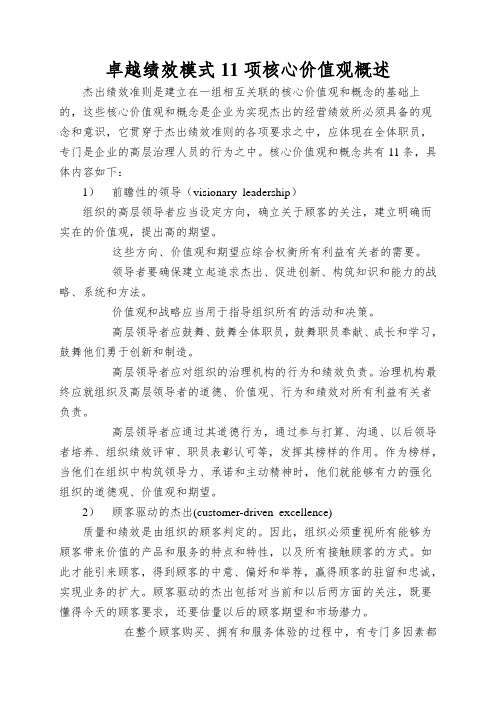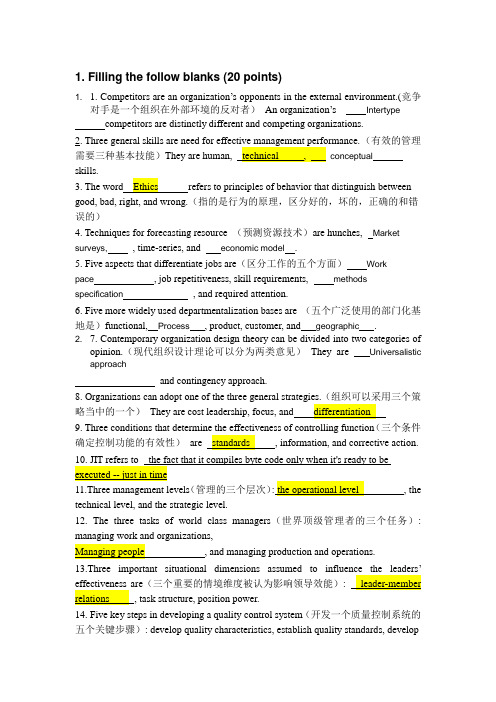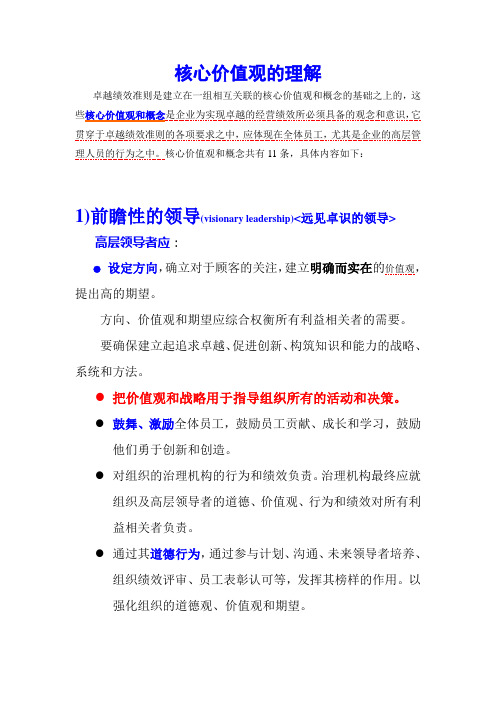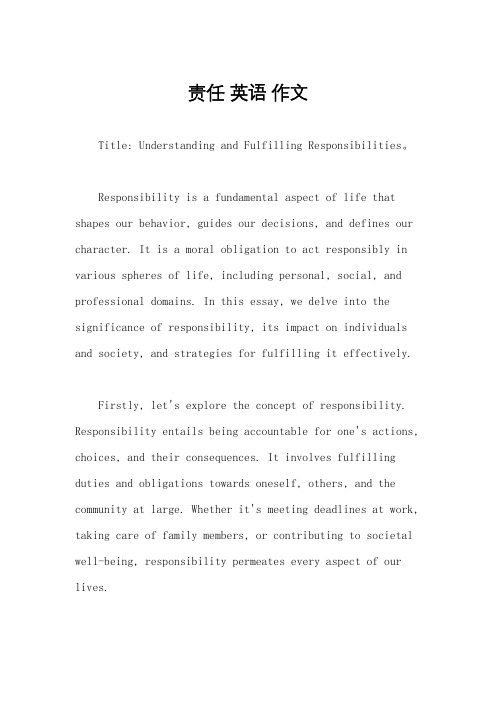5. Managing Social Responsibility and Ethics
卓越绩效模式11项核心价值观概述

卓越绩效模式11项核心价值观概述杰出绩效准则是建立在一组相互关联的核心价值观和概念的基础上的,这些核心价值观和概念是企业为实现杰出的经营绩效所必须具备的观念和意识,它贯穿于杰出绩效准则的各项要求之中,应体现在全体职员,专门是企业的高层治理人员的行为之中。
核心价值观和概念共有11条,具体内容如下:1)前瞻性的领导(visionary leadership)组织的高层领导者应当设定方向,确立关于顾客的关注,建立明确而实在的价值观,提出高的期望。
这些方向、价值观和期望应综合权衡所有利益有关者的需要。
领导者要确保建立起追求杰出、促进创新、构筑知识和能力的战略、系统和方法。
价值观和战略应当用于指导组织所有的活动和决策。
高层领导者应鼓舞、鼓舞全体职员,鼓舞职员奉献、成长和学习,鼓舞他们勇于创新和制造。
高层领导者应对组织的治理机构的行为和绩效负责。
治理机构最终应就组织及高层领导者的道德、价值观、行为和绩效对所有利益有关者负责。
高层领导者应通过其道德行为,通过参与打算、沟通、以后领导者培养、组织绩效评审、职员表彰认可等,发挥其榜样的作用。
作为榜样,当他们在组织中构筑领导力、承诺和主动精神时,他们就能够有力的强化组织的道德观、价值观和期望。
2)顾客驱动的杰出(customer-driven excellence)质量和绩效是由组织的顾客判定的。
因此,组织必须重视所有能够为顾客带来价值的产品和服务的特点和特性,以及所有接触顾客的方式。
如此才能引来顾客,得到顾客的中意、偏好和举荐,赢得顾客的驻留和忠诚,实现业务的扩大。
顾客驱动的杰出包括对当前和以后两方面的关注,既要懂得今天的顾客要求,还要估量以后的顾客期望和市场潜力。
在整个顾客购买、拥有和服务体验的过程中,有专门多因素都会阻碍顾客所体察到的价值和中意。
这些因素包括了组织与顾客间的关系,这种关系有助于建立信任、信心和忠诚。
顾客驱动的杰出其含义远不止减少缺陷和差错,符合规范,或是减少埋怨。
昆明犬证办理流程

昆明犬证办理流程1.首先,您需要带着犬只的身份证件到当地的宠物管理部门办理登记手续。
First, you need to bring the dog's identity documents to the local pet management department for registration procedures.2.办理登记手续时,需要提供犬只的疫苗接种证明和体检报告。
During the registration procedures, you need to provide the dog's vaccination certificate and health examination report.3.宠物管理部门会核对犬只的身份证件和健康情况,确保符合办证条件。
The pet management department will verify the dog's identity documents and health conditions to ensure compliance with the licensing conditions.4.一般情况下,办理犬证需要缴纳一定的费用,具体费用标准可以向宠物管理部门咨询。
In general, a certain fee is required for the dog license, and the specific fee standard can be consulted with the pet management department.5.在完成申请和缴费后,通常需要等待一定的审批时间,宠物管理部门会对犬只的登记申请进行审核。
After completing the application and payment, it usually takes a certain amount of time for approval. The pet management department will review the dog's registration application.6.如果申请通过审批,宠物管理部门会为您颁发犬证,并告知领取方式和时限。
现代管理学考题,含答案(英文)

1. Filling the follow blanks (20 points)1. 1. Competitors are an organization’s opponents in the external environment.(竞争对手是一个组织在外部环境的反对者)An organization’s Intertype competitors are distinctly different and competing organizations.2. Three general skills are need for effective management performance. (有效的管理需要三种基本技能)They are human, conceptualskills.good, bad, right, and wrong.(指的是行为的原理,区分好的,坏的,正确的和错误的)4. Techniques for forecasting resource (预测资源技术)are hunches, Market surveys,, time-series, and economic model.5. Five aspects that differentiate jobs are(区分工作的五个方面)Work pace, job repetitiveness, skill requirements, methods specification, and required attention.6. Five more widely used departmentalization bases are (五个广泛使用的部门化基地是)functional, Process, product, customer, and geographic.2. 7. Contemporary organization design theory can be divided into two categories ofopinion.(现代组织设计理论可以分为两类意见)They are Universalistic approachand contingency approach.略当中的一个)(三个条件确定控制功能的有效性)aretechnical level, and the strategic level.12. The three tasks of world class managers(世界顶级管理者的三个任务): managing work and organizations,13.Three important situational dimensions assumed to(三个重要的情境维度被认为影响领导效能):14. Five key steps in developing a quality control system(开发一个质量控制系统的五个关键步骤): develop quality characteristics, establish quality standards, developquality review program, build commitment to quality,: policy, information,engineering and design,16. Job depth refers to(工作深度指的是)discretion or control over the job.17. Strategy involves the selection of missions, and appropriate courses of action to achieve theses objectives.(战略涉及任务选择)18. Richard Hackman has identified five core dimensions that provide enrichment for jobs.(rh variety, taskidentity, task significance, autonomy, and19. ___P/OM_______ goes well beyond manufacturing operations involving the assembly of products. (远远超出了涉及产品的装配制造业务)It also covers the operation of banks, transportation companies, hospitals and clinics, school systems, insurance companies, and high-technology firms.(它还包括银行,经营运输公司,医院和诊所,学校系统,保险公司,和高科技公司)20. Contemporary organization design theory can be divided into two categories of opinion. (现代组织设计理论可以分为两类意见)The second category of opinion states that the situation. This category is______.⒉Identifying True or false of the following sentences (20 points)Please write you answer into the following table1. Mintzberg found that managers regardless of the type of organization or the level in the organization perform similar role(明茨伯格发现管理者不论什么类型的组织或组织中的水平发挥类似的作用)T2. Social responsiveness has occurred when a business has met only its economic and legal responsibilities.(社会反应发生时,企业只见过它的经济和法律责任。
中国青年使命英语作文

中国青年使命英语作文The mission of the Chinese youth is multifaceted and deeply rooted in the countrys rich history cultural heritage and rapid modernization. As the future leaders and innovators of China young people have a significant role to play in shaping the nations progress and contributing to global development. Here are some key aspects of the Chinese youths mission1. Cultural Preservation and Promotion Chinese youth are tasked with preserving the countrys ancient traditions and cultural heritage. They are encouraged to learn about and appreciate the arts literature philosophy and history that have shaped China over thousands of years. By doing so they can help to promote Chinese culture on the global stage.2. Education and Lifelong Learning The pursuit of knowledge is a fundamental aspect of the Chinese youths mission. With the rapid development of technology and the increasing complexity of the world continuous learning is essential. Young people are expected to excel in their studies and to engage in lifelong learning to adapt to the changing world.3. Innovation and Technological Advancement China is at the forefront of technological innovation and its youth are expected to contribute to this progress. They are encouraged to think creatively to develop new ideas and to push the boundaries of what is possible in fields such as artificial intelligence renewable energy and biotechnology.4. Economic Development The Chinese economy has grown significantly in recent decades and the youth play a crucial role in sustaining this growth. They are expected to contribute to the economy by starting businesses working in various industries and participating in international trade.5. Social Responsibility and Community Service Chinese youth are also expected to take on social responsibilities such as volunteering participating in community service and advocating for social justice. They are encouraged to work towards a more equitable and harmonious society.6. Environmental Stewardship With growing concerns about climate change and environmental degradation the Chinese youth are called upon to be stewards of the environment. This includes promoting sustainable practices advocating for environmental protection and contributing to the development of green technologies.7. Global Citizenship In an increasingly interconnected world Chinese youth are expected to be global citizens. They should be aware of international issues engage in crosscultural exchanges and contribute to solving global challenges such as poverty disease and conflict resolution.8. National Identity and Patriotism While embracing global perspectives Chinese youth are also encouraged to maintain a strong sense of national identity and patriotism. They are expected to contribute to the nations development and to take pride in Chinas achievements.9. Health and Wellbeing The Chinese youth are also responsible for maintaining their physical and mental health. This includes participating in sports eating healthily and managing stress which are all essential for a productive and fulfilling life.10. Leadership and Influence As future leaders Chinese youth are expected to develop leadership skills and to use their influence to inspire and motivate others. They should be prepared to take on leadership roles in various sectors from business to politics to social activism.In conclusion the mission of the Chinese youth is to balance the preservation of traditional values with the embrace of modern advancements to contribute to the nations prosperity and to participate actively in the global community. By doing so they will not only shape the future of China but also play a significant role in the worlds development.。
核心价值观解释

核心价值观的理解卓越绩效准则是建立在一组相互关联的核心价值观和概念的基础之上的,这些核心价值观和概念是企业为实现卓越的经营绩效所必须具备的观念和意识,它贯穿于卓越绩效准则的各项要求之中,应体现在全体员工,尤其是企业的高层管理人员的行为之中。
核心价值观和概念共有11条,具体内容如下:1)前瞻性的领导(visionary leadership)<远见卓识的领导>高层领导者应:●设定方向,确立对于顾客的关注,建立明确而实在的价值观,提出高的期望。
方向、价值观和期望应综合权衡所有利益相关者的需要。
要确保建立起追求卓越、促进创新、构筑知识和能力的战略、系统和方法。
●把价值观和战略用于指导组织所有的活动和决策。
●鼓舞、激励全体员工,鼓励员工贡献、成长和学习,鼓励他们勇于创新和创造。
●对组织的治理机构的行为和绩效负责。
治理机构最终应就组织及高层领导者的道德、价值观、行为和绩效对所有利益相关者负责。
●通过其道德行为,通过参与计划、沟通、未来领导者培养、组织绩效评审、员工表彰认可等,发挥其榜样的作用。
以强化组织的道德观、价值观和期望。
2)顾客驱动的卓越(customer-driven excellence)<以顾客为导向追求卓越>顾客驱动的卓越是一个战略性的概念●质量和绩效是由组织的顾客判定的。
因此,组织必须重视所有能够为顾客带来价值的产品和服务的特征和特性,以及所有接触顾客的方式。
使顾客得到满意、偏好和推荐,赢得驻留和忠诚,实现业务的扩大。
●顾客驱动的卓越包括了对当前和未来两方面的关注――既要理解今天的顾客要求,还要预计未来的顾客期望和市场潜力。
●在整个顾客购买、拥有和服务体验的过程中,有很多因素都会影响顾客所体察到的价值和满意。
这些因素包括了组织与顾客间的关系,这种关系有助于建立信任、信心和忠诚。
●顾客驱动的卓越其含义远不止减少缺陷和差错、符合规范、或是减少抱怨。
不过,减少缺陷和差错以及消除造成不满的原因,影响着顾客对于组织的看法,从而也是顾客驱动的卓越的重要组成部分。
责任 英语 作文

责任英语作文Title: Understanding and Fulfilling Responsibilities。
Responsibility is a fundamental aspect of life that shapes our behavior, guides our decisions, and defines our character. It is a moral obligation to act responsibly in various spheres of life, including personal, social, and professional domains. In this essay, we delve into the significance of responsibility, its impact on individuals and society, and strategies for fulfilling it effectively.Firstly, let's explore the concept of responsibility. Responsibility entails being accountable for one's actions, choices, and their consequences. It involves fulfilling duties and obligations towards oneself, others, and the community at large. Whether it's meeting deadlines at work, taking care of family members, or contributing to societal well-being, responsibility permeates every aspect of our lives.In personal life, responsibility manifests throughself-discipline, integrity, and self-care. It involves making wise decisions that align with our values and goals, taking ownership of our mistakes, and striving for personal growth and development. For instance, maintaining a healthy lifestyle, managing finances prudently, and nurturing relationships require a sense of responsibility towards oneself and others.In the social sphere, responsibility entails contributing positively to the welfare of the community and respecting the rights and dignity of fellow human beings.It involves being empathetic, compassionate, and actively engaging in activities that promote social justice and equality. Whether it's volunteering for a cause, advocating for marginalized groups, or practicing environmental sustainability, societal responsibility fosters a sense of belonging and collective well-being.Moreover, responsibility is integral to professional success and ethical conduct in the workplace. It involves fulfilling job roles and duties diligently, adhering toprofessional ethics and standards, and fostering a culture of trust and accountability within organizations. Employees who demonstrate responsibility exhibit reliability, initiative, and a commitment to excellence, thereby contributing to organizational effectiveness and success.However, fulfilling responsibilities can be challenging amidst competing priorities, unforeseen obstacles, and societal expectations. Hence, it is essential to cultivate certain habits and mindset to effectively navigate through these challenges and fulfill responsibilities withintegrity and resilience.One strategy is to prioritize tasks based on their importance and urgency, thereby allocating time and resources efficiently. Setting realistic goals, creating action plans, and staying organized can help in managing responsibilities effectively and mitigating stress and overwhelm.Furthermore, effective communication is crucial in clarifying expectations, seeking support when needed, andcollaborating with others to accomplish common goals. Whether it's communicating with family members, colleagues, or community stakeholders, clear and open communication fosters trust, mutual understanding, and synergy infulfilling responsibilities collectively.Additionally, cultivating self-discipline andresilience enables individuals to stay focused, motivated, and adaptable amidst setbacks and challenges. Developing a growth mindset, embracing failures as learning opportunities, and maintaining a positive outlook empower individuals to persevere and succeed in fulfilling their responsibilities despite obstacles.In conclusion, responsibility is a cornerstone of ethical conduct, personal integrity, and societal progress. By embracing responsibility in personal, social, and professional spheres of life, individuals contribute to their own well-being and the welfare of others. Through effective prioritization, communication, and resilience, individuals can navigate through challenges and fulfill responsibilities with diligence, integrity, and purpose.Ultimately, it is by fulfilling our responsibilities that we uphold the values of accountability, integrity, and mutual respect, thereby fostering a harmonious and flourishing society.。
有责任的英语

有责任的英语Responsibility is a concept that plays a critical role in our day to day lives. It refers to the obligation we face towards fulfilling our duties and commitments, managing our actions, and accepting the consequences that follow them. It is an essential quality that we develop and nurture from an early age and carry with us throughout our lives. In this essay, we will explore the importance of responsibility in different aspects of life.Personal ResponsibilityPersonal responsibility is the foundation of a successful life. It involves being accountable for our choices and actions and taking charge of our lives. It means owning up to the consequences of our decisions and learning from our mistakes. Personal responsibility encompasses various areas of life, such as physical, emotional, and social well-being, financial stability, and career growth.Physical responsibility involves taking care of our bodies by maintaining good health habits such as exercising regularly, eating a balanced diet, getting enough sleep, and avoiding unhealthy habits such as smoking and drug use. By embracing physical responsibility, we become strong, energetic, and less vulnerable to chronic illnesses.Emotional responsibility requires us to manage our feelings and reactions towards life situations. We must take responsibility for our emotional reactions and develop strategies to control them in stressful situations. By doing so, we can avoid reckless behavior and make rational decisions even in challenging circumstances.Social responsibility is our duty to contribute to society in positive ways. We must recognize the impact of our actions on others and adopt practices that promote collective well-being. Social responsibility entails engaging in community service, protecting the environment, and respecting cultural diversity.Financial responsibility involves managing our finances prudently. It involves setting financial goals, creating budgets, saving, and investing wisely. By being financially responsible, we can avoid debts, build wealth, and secure our financial future.Professional ResponsibilityIn the workplace, professional responsibility involves being accountable for our actions and decisions while fulfilling our job responsibilities. It requires us to act ethically, meet deadlines, and maintain good relationships with coworkers and clients. Professional responsibility involves four critical aspects: task responsibility, team responsibility, client responsibility, and personal responsibility.Task responsibility refers to our commitment to completing work tasks on time and meeting quality standards. As professionals, we must deliver our work to the best of our ability, and take ownership of our mistakes when they occur.Team responsibility involves collaborating with others, supporting team members, and contributing to team goals. We must respect our coworkersand work towards creating a supportive environment that promotes growth and productivity.Client responsibility involves ensuring that clients receive high-quality products or services. We must understand the needs of our clients, communicate effectively, and provide timely solutions to problems that may arise.Personal responsibility involves demonstrating qualities such as honesty, transparency, and good communication that promote professional growth and respect within the workplace.Societal ResponsibilitySocietal responsibility is our obligation to contribute to society's development while fulfilling our individual duties. It involves participating in social causes, protecting human rights, and promoting social justice. Societal responsibility involves various aspects such as environmental responsibility, community responsibility, and philanthropic responsibility.Environmental responsibility requires us to be mindful of the environment's well-being by adopting sustainable practices, reducing pollution, and conserving natural resources.Community Responsibility involves getting involved in initiatives that promote community development, such as volunteering in local organizations, donating to charities, and participating in social causes that impact society.Philanthropic responsibility involves donating time, money, or other resources to charitable organizations that promote positive social change.ConclusionResponsibility is a critical aspect of life that requires us to stay accountable for our actions and decisions. By embracing responsibility in different areas of our lives, we can lead fulfilling and successful lives while contributing to society's growth and well-being. Being responsible is not only an individual mandate, but it is also a societal obligation that helps build a cohesive and sustainable world.。
英文谈话年终总结范文

As we bid farewell to another year, it is a fitting time to reflect on the conversations we've had, the connections we've forged, and the insights we've gained. This year has been marked by numerous exchanges that have not only enriched our personal lives but also shaped our professional growth. Below is a summary of the key themes and takeaways from our conversational exchanges throughout the year.1. Professional Development and LearningThis year, our conversations revolved heavily around professional development. We engaged in discussions about the latest industry trends, innovative technologies, and effective strategies for career advancement. From virtual workshops to webinars, our exchanges provided us with a wealth of knowledge that helped us stay ahead in our respective fields.Key Takeaways:- Continuous learning is crucial for personal and professional growth.- Networking with peers and mentors can provide valuable insights and opportunities.- Staying abreast of industry advancements is essential to remain competitive.2. Collaboration and TeamworkThe emphasis on collaboration and teamwork was evident in our conversational exchanges. We discussed the importance of effective communication, the benefits of diverse team compositions, and the challenges of remote work. These discussions highlighted the need for fostering a culture of inclusivity and mutual respect in the workplace.Key Takeaways:- Open and honest communication is the cornerstone of successful teamwork.- Diversity in teams leads to creative problem-solving and innovation.- Flexibility and adaptability are key to overcoming the challenges of remote work.3. Personal Growth and Well-beingOur conversations also delved into the importance of personal growth and well-being. We shared experiences, offered support, and provided advice on managing stress, maintaining work-life balance, and nurturing personal passions. These exchanges reminded us that our well-being is just as important as our professional achievements.Key Takeaways:- Self-care is non-negotiable and should be prioritized.- Building a support network is essential for mental and emotional well-being.- Finding joy in everyday moments is a powerful way to enhance our quality of life.4. Social Responsibility and SustainabilityAs the year progressed, we increasingly discussed the importance of social responsibility and sustainability. Our conversations focused on how businesses can contribute to a better world, from adopting eco-friendly practices to supporting local communities. This theme highlighted the growing awareness of corporate social responsibility (CSR) and its impact on society.Key Takeaways:- CSR initiatives can create a positive ripple effect within the community.- Sustainable practices are not only environmentally beneficial but also economically viable.- Companies that prioritize social responsibility tend to enjoy greater customer loyalty and brand reputation.5. Future Outlook and PredictionsThe final theme of our conversational exchanges was the future outlook. We engaged in speculative discussions about technological advancements, shifts in consumer behavior, and the potential impact of geopolitical events. These conversations helped us anticipate potential challenges and opportunities that may arise in the coming years.Key Takeaways:- Staying informed about future trends is essential for strategic planning.- Flexibility and agility will be key to adapting to an ever-changing landscape.- Collaboration across disciplines and industries will be crucial for addressing complex global issues.In conclusion, our year-end summary of conversational exchanges reveals a wealth of insights and experiences that have shaped our understanding of the world around us. As we move forward, we are grateful for the connections we've made, the knowledge we've gained, and the inspiration we've received. Here's to another year of enriching conversations and continued growth!。
- 1、下载文档前请自行甄别文档内容的完整性,平台不提供额外的编辑、内容补充、找答案等附加服务。
- 2、"仅部分预览"的文档,不可在线预览部分如存在完整性等问题,可反馈申请退款(可完整预览的文档不适用该条件!)。
- 3、如文档侵犯您的权益,请联系客服反馈,我们会尽快为您处理(人工客服工作时间:9:00-18:30)。
3. Ethical Behavior
Factors: level of moral development + other modeavior
Level of moral development (a measure of independence from outside sources) • Preconventional – personal consequences (avoiding punishment) • Conventional – living up to expectations of others • Principled – following ethical principles even if it violates the rules
3. Ethical Behavior
Is it ethical to: • To use a company car for private use? • To bribe a government official to deal with a permit application faster? • To use a company phone to call your friends? • To give students correct answers for the final exam? Ethics – principles, values, and beliefs that define right and wrong decisions and behavior, moral principles that control or influence a person’s behaviour
a) b) c) d) e)
WTO IMF WB OECD EU
Managing Responsibility and Ethics
Managing Responsibility and Ethics – Outline
1. 2. 3. 4. 5. Social Responsibility Green Management and Sustainability Ethical Behavior Encouraging Ethical Behavior Issues in Today’s World
1. Social Responsibility
Social obligation – A company has an obligation to meet certain economic and legal responsibilities. It does what it’s obliged to do and nothing more. Focus is on making profits. However, companies shouldn’t be responsible only to shareholders but also to the larger society: They must balance obligations to shareholders with obligations to the public good. Social responsiveness – in response to some popular social need Social responsibility – business’s intention, beyond its economic and legal obligations, to pursue long-term goals that are good for society. A socially responsible company does what it can to help improve society because it’s the right thing to do. Being socially responsible doesn’t appear to hurt the company’s economic performance.
2. Green Management and Sustainability
2. Green Management and Sustainability
Going green: • Light green approach – doing what is required by law, which is social obligation, little environmental sensitivity • Market approach – responding to environmental preferences of the customers (social responsiveness) • Stakeholder approach – responding to the environmental demands of multiple stakeholders (social responsiveness) • Activist/dark green approach – looking for ways to respect and preserve the earth and its natural resources (social responsibility)
Review
• Reducing the world poverty by providing members (especially poor countries) with financial support is the main goal of which organization? • Dealing with trade rules among nations, helping countries conduct trade through a system of rules, promoting and protecting global trade are goals of which organization?
Review
Global sourcing refers to: a) Acquiring products made abroad and selling them domestically b) One organization giving another organization the right to use its brand name, technology or product specification c) A partnership between an organization and a foreign company partner d) Purchasing materials or labor from around the world wherever it is cheapest
Review
• • • • • Global sourcing Exporting/importing Licensing/franchising Strategic alliance (joint venture) Foreign subsidiary
Review
The belief that the best work approaches and practices are those of the home country (the country where the company’s headquarters are located) is: a) Polycentric attitude b) Geocentric attitude c) Ethnocentric attitude
3. Ethical Behavior
When an employee does something unethical, managers must punish the offender and publicize the fact by making the outcome visible to everyone in the organization. This practice sends a message that doing wrong has a price and it’s not in employees’ best interest to act unethically!
3. Ethical Behavior
Organizational culture • shared values and cultural strength • Behavior of managers • Strong vs. weak culture Issue intensity • greatness of harm, consensus of wrong, probability of harm, immediacy of consequences, proximity of victims, concentration of effect
2. Green Management and Sustainability
Green management – considering the impact on the natural environment • Not using dangerous substances in products • Setting up beehives on hotel rooftops • Reducing greenhouse emissions • Using renewable energy sources, recycled materials • Preserving forests
3. Ethical Behavior
